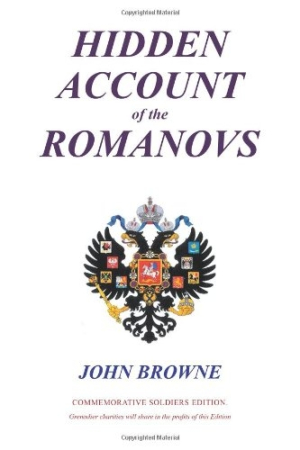Hidden Account of the Romanovs
Commemorative Soldiers Edition
Browne’s book combines real history with realistic characters caught up in a gripping tale of war.
A book of fascinating fact and compelling fiction, John Browne’s Hidden Account of the Romanovs: Commemorative Soldiers Edition covers Great Britain’s participation in World War I, the plight of Russia’s imperial family, and the Russian civil war.
The book begins in 2003, when fictional British banker Peregrine Coulter is asked to research files on a secret bank account established by Empress Alexandra of Russia before her death in July 1918. The story then shifts to 1914, with the fictional protagonist, seventeen-year-old Alex Fanshawe, joining the British Grenadier Guards as a second lieutenant, just as Britain declares war with Germany.
The focus moves from Fanshawe’s experiences in trench and aerial warfare and later espionage work in Russia to the imprisonment of Emperor Nicholas II and his family, and fighting among opposing Russian forces until 1920. Periodically, attention moves back to Coulter’s efforts to trace the secret account and substantiate existence of a surviving Romanov heir to the fortune. Photographs, paintings, and maps add visual impact to these multiple dramas.
Browne, a retired major in the British Grenadiers of the Royal Guard, names numerous Grenadier heroes in his book and will share profits with Grenadier charities.
During the spontaneous cease-fire between German and Allied infantry forces on Christmas Eve 1914, Alex helps retrieve the bodies of fallen comrades from “no man’s land” between opposing trenches. Shocked by the carnage, he collects identity discs, but “he allowed himself a wry smile as he thought back to the soldiers’ seemingly callous description of identity tags as ‘cold meat ticks.’” Browne exhibits this kind of realistically compelling narrative throughout the book.
Discussing Imperial Russia while dining with a senior bank colleague, Coulter meets an American financier, Henry Armitage. Asked about the gold monkey charm on his watch chain, Armitage explains that the “hear no evil” monkey had been the good-luck charm of an elderly and most elegant Russian woman whom he’d met over a decade earlier. Browne deftly drops this clue and others to support his findings and tie the subplots together.
The author also adds narrative tension with suspenseful chapter endings that urge readers to continue. For example, a young Russian woman, posing as a boy with the assumed name of Sasha, escapes her pursuers in the woods. She awakes the next morning as two Cossack soldiers approach. Taking quick aim, she releases the safety catch of her rifle and moves her finger to the trigger, just as “she felt a stab of cold steel in the back of her neck. By instinct, she froze.”
Given the abundant information presented, the author’s skilled treatment rarely slips into expository mode. Descriptive passages and action scenes transition smoothly from one to the next, and they are inhabited by characters who experience both extreme danger and remarkably good fortune. The juxtaposition of fear and bliss in the romance between Sasha and Alex adds poignant tension to their story. However, spelling and typographical errors abound, and lists of military heroes interrupt the narrative flow.
Despite its flaws, Hidden Account of the Romanovs deserves a wide readership, especially among people interested in the puzzling events of this historical era, which Browne embellishes with well-told fiction.
Reviewed by
Margaret Cullison
Disclosure: This article is not an endorsement, but a review. The publisher of this book provided free copies of the book and paid a small fee to have their book reviewed by a professional reviewer. Foreword Reviews and Clarion Reviews make no guarantee that the publisher will receive a positive review. Foreword Magazine, Inc. is disclosing this in accordance with the Federal Trade Commission’s 16 CFR, Part 255.

